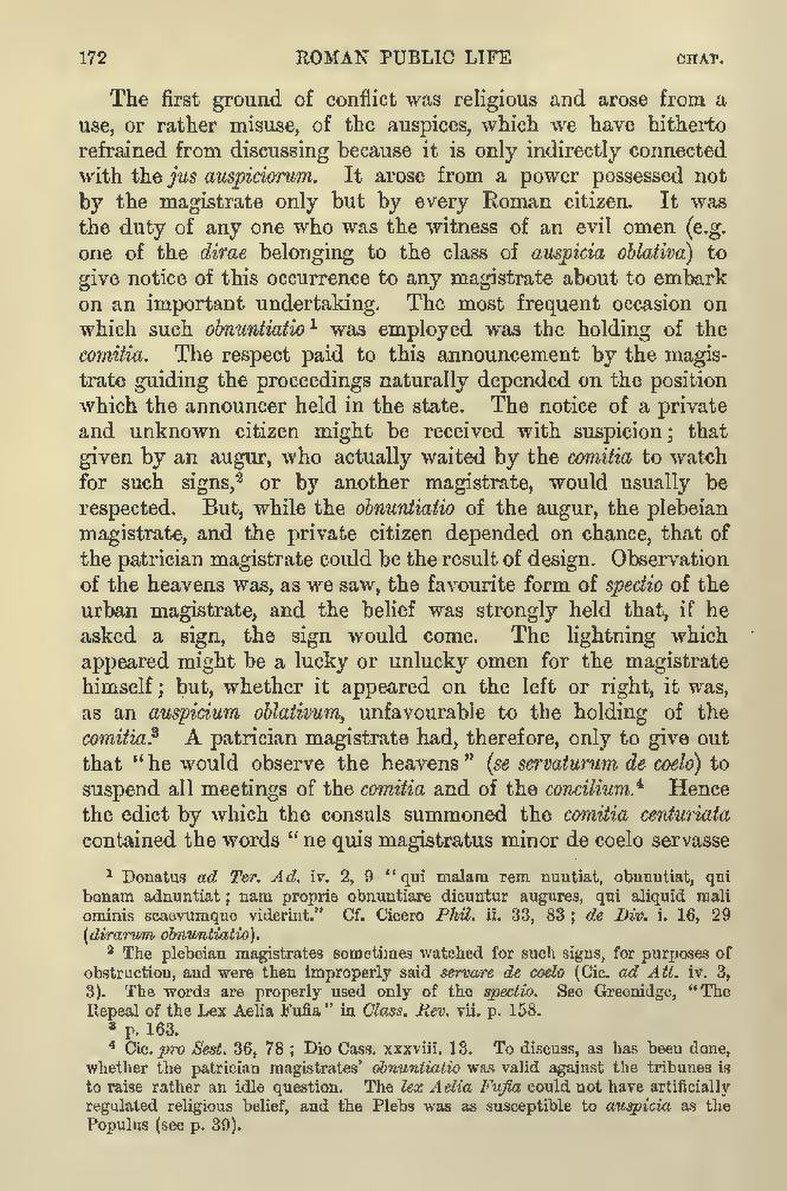The first ground of conflict was religious and arose from a use, or rather misuse, of the auspices, which we have hitherto refrained from discussing because it is only indirectly connected with the jus auspiciorum. It arose from a power possessed not by the magistrate only but by every Roman citizen. It was the duty of any one who was the witness of an evil omen (e.g. one of the dirae belonging to the class of auspicia oblativa) to give notice of this occurrence to any magistrate about to embark on an important undertaking. The most frequent occasion on which such obnuntiatio[1] was employed was the holding of the comitia. The respect paid to this announcement by the magistrate guiding the proceedings naturally depended on the position which the announcer held in the state. The notice of a private and unknown citizen might be received with suspicion; that given by an augur, who actually waited by the comitia to watch for such signs,[2] or by another magistrate, would usually be respected. But, while the obnuntiatio of the augur, the plebeian magistrate, and the private citizen depended on chance, that of the patrician magistrate could be the result of design. Observation of the heavens was, as we saw, the favourite form of spectio of the urban magistrate, and the belief was strongly held that, if he asked a sign, the sign would come. The lightning which appeared might be a lucky or unlucky omen for the magistrate himself; but, whether it appeared on the left or right, it was, as an auspicium oblativum, unfavourable to the holding of the comitia.[3] A patrician magistrate had, therefore, only to give out that "he would observe the heavens" (se servaturum de coelo) to suspend all meetings of the comitia and of the concilium.[4] Hence the edict by which the consuls summoned the comitia centuriata contained the words "ne quis magistratus minor de coelo servasse
- ↑ Donatus ad Ter. Ad. iv. 2, 9 "qui malam rem nuntiat, obnuntiat, qui bonam adnuntiat; nam proprie obnuntiare dicuntur augures, qui aliquid mali ominis scaevumque viderint." Cf. Cicero Phil. ii. 33, 83; de Div. i. 16, 29 (dirarum obnuntiatio).
- ↑ The plebeian magistrates sometimes watched for such signs, for purposes of obstruction, and were then improperly said servare de coelo (Cic. ad Att. iv. 3, 3). The words are properly used only of the spectio. See Greenidge, "The Repeal of the Lex Aelia Fufia" in Class. Rev. vii. p. 158.
- ↑ p. 163.
- ↑ Cic. pro Sest. 36, 78; Dio Cass. xxxviii. 13. To discuss, as has been done, whether the patrician magistrates' obnuntiatio was valid against the tribunes is to raise rather an idle question. The lex Aelia Fufia could not have artificially regulated religious belief, and the Plebs was as susceptible to auspicia as the Populus (see p. 39).
